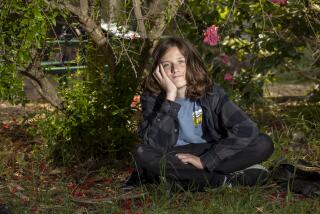How One Person Can Make a World of Difference
- Share via
There is a time-tested adage that the good we do lives long after us. A modern prophet, Ezra Taft Benson, taught: “The world would mold men by changing their environment. Christ changes men, who then change their environment.”
Stories of courageous people who did seemingly small things that turned out to have a tremendous effect on later events are told in an exhibit titled “One Person Can Make a Difference” that opened earlier this year at the Museum of Church History and Art in Salt Lake City.
One person who made a difference was Sally Bush Johnston. She was a struggling widow with three children. An old friend, a suitor she had known before she married, came courting. A widower, he wore a fine suit and new boots. He spoke of a prosperous farm with servants. She decided to marry him, but when she arrived at his farm, she found a ramshackle log cabin with no windows and a dirt floor. There were two small children, a girl and a boy, and no servants. Sally knew she had been duped and was about to leave when she looked closely at the children.
The younger was the boy, whose thin face and melancholy gaze made upon her soul an impression as deep as it was instantaneous. At that moment she made the decision to stay “for the boy.” For his sake, she rolled up her sleeves and began to sweep and bring order to the farm. The boy grew up to be the 16th president of the United States. President Abraham Lincoln spoke often of the influence his stepmother had on him as he grew up.
Another person who made a difference was Gail Halvorson. Because of the devastation of World War II and the aftermath, many of the children of Berlin had never tasted candy. Lt. Col. Halvorson, a pilot and bombardier, was assigned to fly cargo into Berlin during the Berlin airlift. He began dropping parachuted candy to the children on the flight path as he flew into Berlin. He told the children they would know him because he would wiggle the wings of his plane. He became known as “Uncle Wiggle Wings,” or the “Candy Bomber.”
His project was supported by many of the pilots and soldiers stationed in Germany. It became known as Operation Little Victuals. People back home joined the effort by making the little parachutes and donating candy. Because of their generosity, he was able to visit children in hospitals and other places where children could not get to the falling parachutes. One person began a project of love, designed to brighten the lives of the less fortunate, and many joined in.
It is interesting to note that during a recent trip to Germany to celebrate the 50th anniversary of the lifting of the Soviet blockade, Halvorson was asked by the commander of the U.S. Air Force in Europe to extend his visit and fly to Albania to examine conditions of Kosovar refugees in Camp Hope. He delivered bags and bags of candy as part of Operating Shining Hope to the children of Kosovo who are living in a refugee camp in Albania’s capital city of Tirana. He said, “like the children of Berlin, the Kosovar children take the brunt of an unrighteous dictator.”
In another place and in another time, a wealthy family in England, spending the weekend with friends, had a near-tragic occurrence. Their son, playing with the children, fell into a swimming pool and was in the process of drowning when the screams of the children attracted the attention of the gardener who came, plunged into the pool, and saved the boy. The boy’s name was Winston Churchill.
His parents, deeply gratified, attempted to reward the gardener. At first he hesitated, but as they insisted, he said, “I have a son whose lifetime dream it is to be a doctor and I don’t know how we can provide that opportunity for him.”
The Churchills said, “We will see him through and pay for his education.” Later on Winston Churchill, who became prime minister of Great Britain, contracted a severe case of pneumonia. The king sent out word that they wanted the finest physician they could find to attend him. Sir Alexander Fleming, the developer of penicillin, was called and selected to care for the prime minister. He was the son of the gardener. After he was healed, Churchill was to say, “Rarely has one man owed his life twice to the same family.”
A difference can be made even during extreme adversity. In a German prison camp, Pieter Vlam decided not to think about his own suffering. He and other Dutch soldiers decided that they would do what they could to ease the suffering of their fellow prisoners. The 10 of them spent their time looking for ways to make life easier. One Sunday a month, they fasted for two meals and gave their food rations to those who were in dire need. Because of their service, compassion and faith, they changed the lives of many.
It is the duty of each individual to feed the hungry, to clothe the naked, to provide for the widow, to dry up the tear of the orphan, to comfort the afflicted whether in your church, or any other church or no church at all. As each of us show kindness, compassion and love, we are empowered to change the world. We can’t go out and stop a war between nations, but we do have the power to stop little wars in our own homes and communities. We can’t stop the media, but we can stop watching and listening. One person definitely does make a difference.
*
On Faith is a forum for Orange County clergy and others to offer their views on religious topics of general interest. Submissions, which will be published at the discretion of The Times and are subject to editing, should be delivered to Orange County religion page editor Jack Robinson.
More to Read
Sign up for Essential California
The most important California stories and recommendations in your inbox every morning.
You may occasionally receive promotional content from the Los Angeles Times.










